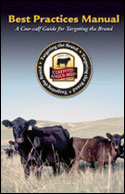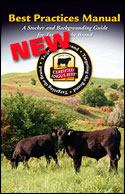Prepare for Low-Stress Weaning
Gentle handling and advance preparation are keys to weaning success.
For spring-calving herds, fall is the time producers turn their attention to the calf, and a gentle touch can help avoid illness and maintain health.
"At weaning, we are most concerned about respiratory disease," says Mike Smith of Liberty Ranch in Plainville, Kan. "The weather conditions in our area influence the frequency of disease a great deal — depending on if we are in a dry, dusty fall or if it's a wet season. No matter what the season, what's becoming more important to us is being conscious about low-stress handling, good vaccinations and deworming to help take a little stress off those calves."
The foundation of his weaning protocol is a respiratory vaccination program. Smith says he uses a modified-live vaccine like Bovi-Shield Gold(R) that helps protect against diseases such as infectious bovine rhinotracheitis (IBR) and bovine viral diarrhea (BVD), in addition to bovine respiratory syncytial virus (BRSV) and parainfluenza type 3 (PI3). He also vaccinates against major clostridial diseases and Mannheimia (Pasteurella) haemolytica, the most common bacterial pathogen involved in BRD.
In addition to vaccinating, Smith says he starts deworming calves with Dectomax® (doramectin) 1% Injectable before they come off grass.
Calves coming off grass will likely have parasites, which in turn can make vaccines less effective. Reducing the parasite burden can help keep the calf in optimal health and prepare it for the stressful time of weaning. In addition, calves have a less mature immune system and can be especially vulnerable to parasites, says Mitch Blanding, Pfizer Animal Health Veterinary Operations.
Smith says he's seen this to be true with the calves at Liberty Ranch, and he attributes additional performance gains to deworming calves at weaning, plus the benefits of a healthier calf overall in the growing yard.
 He has the opportunity to see how these measures pay off. The 800-head Liberty Ranch includes both Limousin and Red Angus cattle, and Smith also manages the ranch's growing yard. The combined effects of handling with care, vaccinating and deworming help result in reductions in the number of pulls and sick calves after weaning.
He has the opportunity to see how these measures pay off. The 800-head Liberty Ranch includes both Limousin and Red Angus cattle, and Smith also manages the ranch's growing yard. The combined effects of handling with care, vaccinating and deworming help result in reductions in the number of pulls and sick calves after weaning.
Smith's protocol is one that would apply to nearly any producer across the country weaning calves. Helping calves prepare for stress with good vaccination and deworming protocols — reducing stress through gentler handling — can help avoid future health problems.
"Anything we can do to reduce the amount of stress is going to enhance protection from disease and maximize potential gain," says Blanding. "Making sure calves are handled carefully, have the right vaccinations and are dewormed can help keep them healthy and gaining throughout the weaning period."
[Click here to go to the top of the page.]





